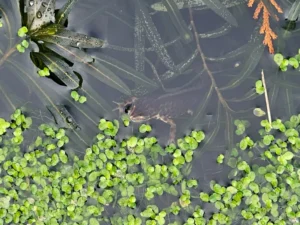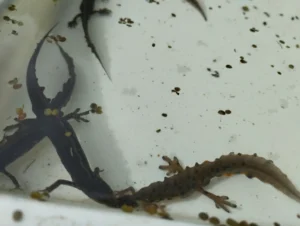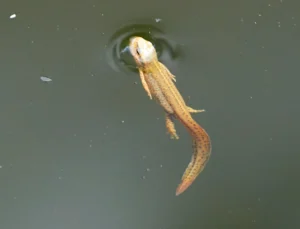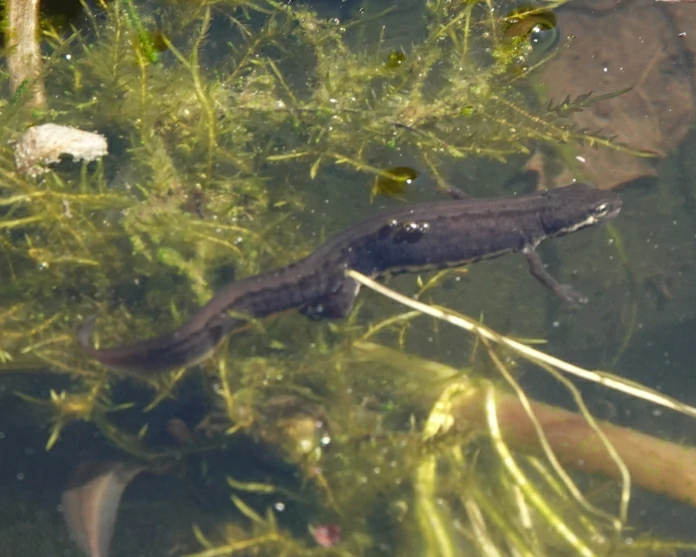Have you ever spotted a little newt swimming in a pond and wondered if it’s a good thing or not? Some people worry newts might hurt fish or plants, while others see them as signs of a healthy pond. So what’s the truth, are newts actually good for ponds?
Newts are good for ponds because they help control insects, add balance to the ecosystem, and show the water is clean and healthy.
Still, like with any wild animal, their role depends on the pond’s size, depth, and what other creatures live there.
Newts as Natural Pest Controllers
One of the biggest ways newts help ponds is by eating insects. Think of mosquitoes on a summer night, buzzing and biting.
Their larvae grow in water, and without predators, they would multiply quickly.

Newts eat mosquito larvae, along with midges, water fleas, and even small worms. In this way, they keep insect numbers from getting out of hand.
For a pond owner, that means fewer mosquitoes around your home.
You might also see them snapping at water beetle larvae, which attack tadpoles. By balancing these insect numbers, newts indirectly help frogs survive too.
Do Newts Harm Fish or Plants?
You might wonder if newts hurt fish or plants in ponds. The short answer is no, they don’t cause problems for either.
Newts are meat-eaters, so they don’t munch on pond plants like some insects or snails do. Your water lilies and reeds are safe.
As for fish, it depends on the type and size of both animals. Large fish like koi or goldfish may eat newt eggs or young newt larvae. But adult newts are quick and slippery, so most pond fish leave them alone.
In very small ponds with lots of newts and no fish, they might eat more tadpoles than you’d like. Still, this doesn’t wipe out frogs; it just balances numbers naturally.
Newts as Signs of a Healthy Pond
Here’s something very important: newts don’t live just anywhere. They need clean water without too many chemicals.
If newts show up in your pond, it usually means the water is clean and has plenty of oxygen. That’s a good sign that your pond is healthy.

It’s almost like a free water-quality test, delivered by nature itself.
For example, people in the UK often celebrate seeing great crested newts in garden ponds. These animals are rare and legally protected.
Their presence shows the pond is doing something right.
The Role of Newts in Pond Food Webs
Every pond is like a tiny web of life. Plants, insects, fish, frogs, and birds all link together. Newts sit right in the middle of that web.
- They eat insects, larvae, and sometimes tadpoles.
- Fish and birds eat them, especially young newts.
- Their eggs and larvae feed dragonfly nymphs and beetle larvae.
This cycle makes sure no single group takes over. Without predators like newts, insects could grow too fast.
Without prey like newts, larger animals like herons or kingfishers would lose a food source.
What About Garden Ponds?
Many people build small ponds in their gardens to bring in wildlife. Newts often find these ponds on their own.
For gardeners, newts are helpful because they eat slugs, snails, and insects that damage plants. When adult newts leave the water in summer, they roam gardens at night hunting for food.

Basically, they become natural pest patrols both in the pond and on land.
Imagine walking outside after dark and spotting a newt under a flower pot, ready to eat slugs. That’s a gardener’s friend right there.
Seasonal Story of Newts in a Pond
To really see why newts matter, it helps to follow them through the seasons:
- Spring – Newts return to ponds to breed. Males wave their tails in courtship dances, and females lay eggs on plant leaves.
- Summer – Newt larvae grow, feeding on insects and small creatures in the water. Some change into juveniles and leave the pond.
- Autumn – Adult newts leave the pond too, spending time under logs or stones in damp places.
- Winter – Many hibernate underground, in leaf litter, or at the bottom of the pond if it doesn’t freeze fully.
Each stage keeps the pond ecosystem active and balanced, spreading benefits across the year.
Are There Any Risks With Newts in Ponds?
It’s fair to ask, are there any downsides to newts in ponds? The truth is, risks are small:
- Tadpoles and eggs – Newts eat frog and toad tadpoles, which can worry people who love frogs. But usually, enough survive to keep populations steady.
- Small fish fry – In fish ponds, newts might eat some tiny fry, though not enough to cause major losses.
- Human handling – Newts have delicate skin and mild toxins to protect themselves. They’re not harmful to ponds, but they shouldn’t be handled often.
In short, newts rarely cause problems, but it’s smart to know their habits.
How to Make a Pond Friendly for Newts
If you like the idea of newts visiting your pond, there are a few simple steps:
- Shallow edges – Newts need gentle slopes to crawl in and out.
- Plants – Add underwater plants for egg-laying, and floating plants for cover.
- No chemicals – Avoid pesticides and herbicides, which harm newts and their prey.
- Rocks and logs nearby – Newts use them as hiding spots when they leave the pond.
- Fish balance – Avoid overstocking fish, as they eat newt eggs and larvae.
These steps make the pond welcoming not just for newts, but for frogs, dragonflies, and birds too.
Newts Compared to Other Pond Animals
Sometimes people compare newts to frogs or salamanders. While they share some traits, newts are unique in how they use both water and land:
- Frogs usually rely on ponds only for breeding.
- Salamanders are more secretive and often stay underground.
- Newts move between pond and garden life easily, linking both worlds.
This makes newts special. They connect water and land ecosystems in a way few other creatures do.
Conclusion
So, are newts good for ponds? The answer is yes, they’re very good.
They eat insects like mosquito larvae, keep pond life balanced, and show that the water is clean. They don’t harm plants and only lightly affect fish or tadpoles. On land, they help gardeners by eating slugs and snails.
If you see a newt in your pond, it’s a reason to smile. It means your pond isn’t just a pool of water, but part of a living, breathing ecosystem.
Hi, my name is Ezra Mushala, i have been interested animals all my life. I am the main author and editor here at snakeinformer.com.

